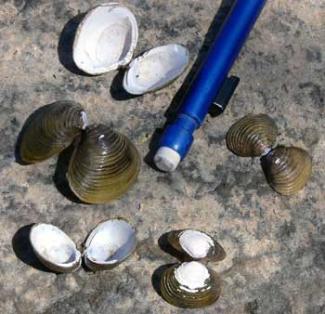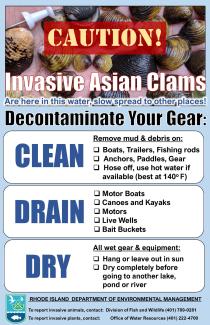Aquatic Invasive Animals

Although aquatic invasive animals are often harder to find than large invasive plant populations, invasive animals can have devastating effects on freshwater ecosystems. Most invasive animals are small and larvae or adults can be transported in bilge water, bait buckets or attached to boats. Others are used as live bait, and extras are discarded into the water. Some were even intentionally stocked. Regardless of the means of introduction, the spread of invasive animals constitutes a serious threat facing our rivers and lakes.
Impacts
Ecological
- cause local extinctions of native species through competition or predation
- degrade or destroy habitat that supports native fish and wildlife
- significantly alter aquatic food webs
- degrade water quality
Recreational
- reduce numbers of sport fish, either by destroying suitable habitat, competing for food or by eating them
- shellfish foul boats and motors
Economic
- damage to infrastructure
- substantial costs to manage once introduced
Which aquatic invasive animals are in RI?
Species Present in Rhode Island
Aquatic Invasive Animal Factsheet: Asian Clam (Corbicula fluminea)
PDF file, about 2megabytes
Aquatic Invasive Animal Distribution Map: Asian Clam (Corbicula fluminea)
PDF file, about 3megabytes
Aquatic Invasive Animal Factsheet: Chinese Mystery Snail (Cipangopadula chinensis)
PDF file, less than 1megabytes
Aquatic Invasive Animal Factsheet: Carp (various)
PDF file, about 1megabytes
Species Not Yet Present in Rhode Island
| Common Name/ Fact Sheet |
Species Name | Nearby Infestations |
|---|---|---|
| zebra mussel | Dreissena polymorpha | MA, CT, VT, NY Click for Map |
| quagga mussel | Dreissena bugensis | NY |
| rusty crayfish | Oronectes rusticus | MA, CT, VT, NH, ME, NY |
| Chinese mitten crab (freshwater!) | Eriocheir sinensis | NY (Long Island Sound/lower Hudson River) |
| Spiny water flea | Bythotrephes cederstroemi | NY |
Report new identifications of invasive animals to (401) 537- 4217

Stop the Spread!
- Inspect and clean. Examine your boat and trailer before and after any use. Carefully remove any mud, plant or animal material before transporting your boat, recreational equipment, fishing gear or equipment.
- Allow time to dry. Clean and dry anything that came in contact with the water (boat, trailers, recreational equipment, clothing, dogs, etc.)
- Isolate and drain. Empty water from boat wells and motors far away from lakes and rivers.
- Discard into trash. Dispose any unused bait into proper garbage receptacles; do not empty bait buckets into the water.
- Prevent releases. Avoid disposing plants, fish or animals from aquariums or water gardens into local water bodies.
Identification and Management of Aquatic Invasive Species
PDF file, about 7megabytes
Identifying Freshwater Aquatic Invasive Species in Rhode Island
PDF file, about 9megabytes
Rhode Island Aquatic Invasive Species Management Plan
PDF file, about 1megabytes
2012 RI Lakes Report
PDF file, about 11megabytes
